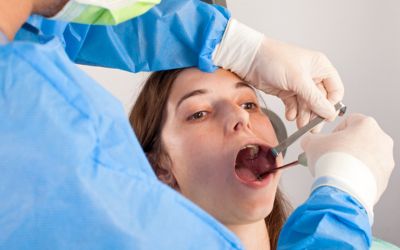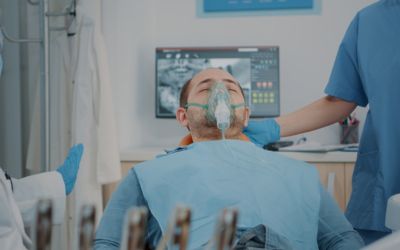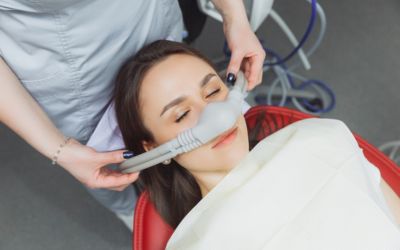News + Articles
Worried About Pain? Understanding Sedation for Dental Implants
Implants are a great way to replace missing teeth. It helps restore your confident smile. But, for best results, you must understand the surgery. This means knowing the types of sedation or anesthetics.

Understanding The Dental Implant Procedure
The process involves placing a titanium screw in your jawbone.
It fuses with the bone over several months. Then, a realistic artificial tooth is attached to the implant.
While the success rate is high, the thought of surgery can cause anxiety.
Luckily, research shows that sedation and anesthesia can significantly reduce these concerns. It can help improve the whole experience.
Type of Anesthetics Used for Dental Implant Surgery
There are three main types of anesthesia used in dentistry:
Local Anesthetic
It is used for dental procedures, including tooth replacement, fillings, crowns, and root canals. It numbs only the surgical site and surrounding area.
You’ll likely remain awake and aware, but you shouldn’t feel pain. The dentist administers local anesthesia by injections into the tissue. It lasts for 1-2 hours.

Note:
- Effects: Numbness around the mouth/jaws.
- Experience: Awake but comfortable.
- Procedure time: Up to 2 hours.
General Anesthesia
This is the deepest level of sedation and renders the patient completely unconscious. It is usually only used for complex surgeries. Or for patients with severe dental fear.

Note:
- Effects: Unconsciousness.
- Experience: Completely asleep.
- Procedure time: Over 2 hours, may vary.
Studies suggest the best type of sedation depends on age and medical history. Also, on anxiety, procedure complexity, and patient preference.
During your consultation, a qualified dentist, Dr. Ronald Pham, will find the best way to address your needs and concerns. He works at Restoration Dental OC. Our goal is for you to feel comfortable throughout your visit.
Type of Sedation Use Getting Dental Implants Surgery
Conscious Sedation
This medication helps you relax and feel less anxious during your dental procedure. There are different levels of sedation, ranging from mild to moderate. Here are some types of sedated for dental implants:
- Nitrous oxide (laughing gas): Nitrous oxide, or laughing gas, is a mild sedative. It eases anxiety and brings calm. You can use it alone for brief procedures. Alternatively, you can combine it with local anesthesia to achieve complete pain control.
- Oral sedation: A pill taken before your procedure offers more profound relaxation. The level of drowsiness will depend on the medication and dosage.
- IV sedation: Medication delivered directly into a vein provides a deeper level of sedation while still keeping you conscious.
- Intranasal sedation: Administered as a nasal spray, this offers mild to moderate sedation with quick onset and recovery. Midazolam is a common medication for this type of sedation.

Note:
- Effects: Drowsiness, possible amnesia.
- Experience: Awake but very relaxed.
- Procedure time: While the 1-2 hour timeframe might be expected for some dental implant procedures, it’s important to note that the length of the procedure depends more on the specific treatment than the type of sedation used.
Benefits of Sedation
- It reduces feelings of pain or discomfort.
- Reduce excessive fear and anxiety.
- Allow you to feel at ease.
- Improve your experience and satisfaction.
Which Sedation Approach Is Right For My Implants?
Every patient has unique anatomy, anxiety levels, and health histories. What’s suitable for one may not suit another. Discuss all options at your consultation. Decide which sedation route you’re most comfortable with.
Some factors impacting the choice of sedation method include:
Number of Implants
- 1-4 implants – laughing gas, oral sedation usually sufficient.
- Full mouth rehabilitation with 6+ implants – IV or general anesthesia is better.
Anxiety Level
- Mild dental anxiety – laughing gas/oral sedation.
- High anxiety or phobias – IV sedation is recommended.
Medical History
- Complex conditions like sleep apnea – general anesthesia in a hospital facility.
- Healthy patients – any sedation approach appropriate.
Invasiveness of Procedure
- Simple extractions, flapless placement – laughing gas/oral sedation
- Sinus lifts, bone grafts – IV sedation advised
Disclaimer: Discuss all unique factors with your sedation dentist when planning implants. Don’t hesitate to ask lots of questions so you can determine the optimal level of sedation for your needs!
Frequently Asked Questions
Which Anesthesia Is Best For Dental Implants?
The best anesthesia for dental implants depends on the person’s needs. It also depends on their medical history and the complexity of the procedure.
Generally, we use local anesthesia to numb the area. This ensures comfort during the implant procedure.
Patients with more anxiety or those having complex surgeries may consider options.
These options include oral sedation, IV sedation, or anesthesia. Each patient should tailor the choice to their specific situation.
What May Be The Safest Type Of Sedation Method Used In Dentistry?
The safest sedation type in dentistry depends on the person’s health. It also depends on the nature of the dental procedure and the patient’s comfort with sedation.
Inhaled minimal sedation (laughing gas) is generally one of the safest methods. It wears off quickly and lets the patient stay conscious and responsive.
However, for healthy patients, other forms are also safe. These include oral and IV sedation. However, they must be provided by a qualified professional.
A full review of the patient’s medical history and current health is crucial. This must happen before we can pick the safest sedation method.

Dr. Ronald Pham, DDS, is a Doctor of Dental Surgery who graduated from the USC Ostrow School of Dentistry in 2015. With over 8 years of experience in restorative dentistry, including dental implants, crowns, bridges, fillings, root canals…
Dr. Pham has restored the smiles of +2,000 patients and is committed to providing professional dental care focused on patient comfort. He achieves this by combining a welcoming space and state-of-the-art dental technology.

Guaranteed Smiles!
As a premiere dentist office in Orange CA, we will always make sure that your experience is memorable, friendly, and professional. We strive to meet your highest expectations in every way imaginable, from your very first interaction with our office staff, to the quality of treatment you receive. We don’t take our patients’ trust for granted, and will promise to over-deliver with your best interest in mind. So give us a call today, and experience our first-class service!
Insurance
Accepted
We proudly accept most dental insurance plans, and welcome cash patients as well. Call us today for more information.
$199
Special
New to our dental office? Take advantage of our New Patient special offer with x-rays, exam, and full report of findings.
Extended
Hours
Do you have an emergency? Need to see us a little later or earlier? Let us know. We can be flexible to meet your busy schedule!
